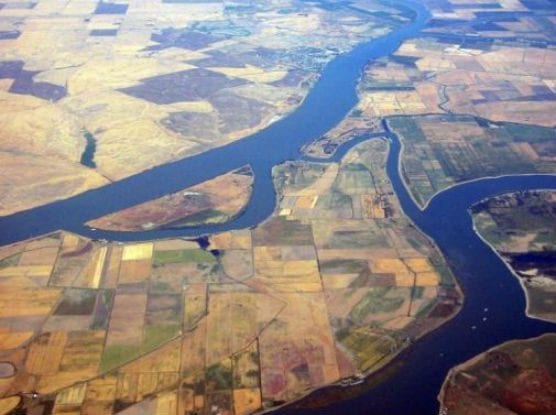SACRAMENTO – Axing former Gov. Jerry Brown’s design for two massive tunnels underneath California’s most important estuary, new Gov. Gavin Newsom’s administration announced Thursday it was scrapping the $17 billion project in favor of a less-expensive, one-tunnel approach, cementing a major win for environmentalists.
Brown championed the project widely known as the Delta Tunnels tirelessly during his final two terms, and on his way out of office was finally able to convince the state’s largest water districts to pick up most of the project’s price tag.
While Brown was able to wrangle up the financing, most of it coming from the Metropolitan Water District of Southern California, the project was far from shovel-ready thanks to countless environmental lawsuits and damning audits.
Newsom, on the other hand, was skeptical of Brown’s proposal on the campaign trail and since taking office in January. On Thursday, he ripped Brown’s litigious plan off life-support by ordering the state agencies in charge of the project to withdraw permits and find a multi-faceted fix to California’s water woes.
“A smaller project, coordinated with a wide variety of actions to strengthen existing levee protections, protect Delta water quality, recharge depleted groundwater reserves and strengthen local water supplies across the state, will build California’s water supply resilience,” said Natural Resources Secretary Wade Crowfoot in a statement.
Officially known as the California WaterFix, the project called for two 30-mile tunnels that would funnel water around the Sacramento-San Joaquin River Delta to aqueducts that supply farmers and cities farther south. The delta is the largest estuary on the West Coast and it supplies water for thousands of farms and an estimated 25 million Californians. Planners said the project would take more than a decade to complete the delta re-plumbing project.
The project didn’t create a new water resource or guarantee more water for Central Valley farmers and cities like Los Angeles and San Diego, but proponents said it would update the state’s water infrastructure and protect it from earthquakes and climate change.
Delta residents and environmental groups warned that if built, the twin tunnels would be the final blow to an ecosystem already beset by poor water quality and declining salmon populations. They worried that depriving the delta of flows from the Sacramento River would spoil water quality by allowing brackish water from the San Francisco Bay to creep deeper into the struggling estuary.
Most environmental groups are still opposed to even a single-tunnel project in the delta, but Thursday’s news gives them hope that Newsom will include them in the planning process or even give them a seat at the bargaining table.
“Naturally, as delta people we don’t care for tunnels, but we look forward to engaging in an honest and transparent public process that helps move us towards the co-equal goals of the Delta Reform Act of 2009, including reducing reliance on the delta,” said Barbara Barrigan-Parrilla, executive director of Restore the Delta.
State lawmakers representing parts of the delta thanked Gov. Newsom for ending the “fatally flawed” Delta Tunnels.
“By closing this chapter on the euphemistically named WaterFix, I believe we can move to a thoughtful, collaborative approach that meets our water needs while safeguarding the environmental and economic vitality of the delta,” said state Sen. Bill Dodd in a statement, who represents parts of Yolo, Sacramento, Napa and Contra Costa counties.
Stockton Assemblywoman Susan Eggman tweeted “not a moment too soon!” and applauded Newsom for keeping his word on re-examining the project.
Voters nixed a similar water project in the 1980s but the concept was revived under former Gov. Arnold Schwarzenegger and advanced by Brown.
The announcement means that the state will have to start from scratch on the planning and environmental review process.
Metropolitan, which supplies water for nearly 19 million Californians and was a major backer of the Delta Tunnels, says it looks forward to “expeditiously” advancing a single-tunnel project.
“New conveyance is essential. The current system is already outdated and vulnerable; climate change will further stress it with a future of sea level rise and increasingly intense floods and droughts,” said Metropolitan general manager Jeffrey Kightlinger in a statement.
California Department of Water Resources Director Karla Nemeth says the state is withdrawing water quality permit applications that have already been sent out to the state water board, as well as Endangered Species Act permits before federal agencies. She added that the department will work with local public water agencies to develop the new single-tunnel approach.
Like this:
Like Loading...
Related





 Tweet This
Tweet This Facebook
Facebook Digg This
Digg This Bookmark
Bookmark Stumble
Stumble RSS
RSS


























REAL NAMES ONLY: All posters must use their real individual or business name. This applies equally to Twitter account holders who use a nickname.
No Comments